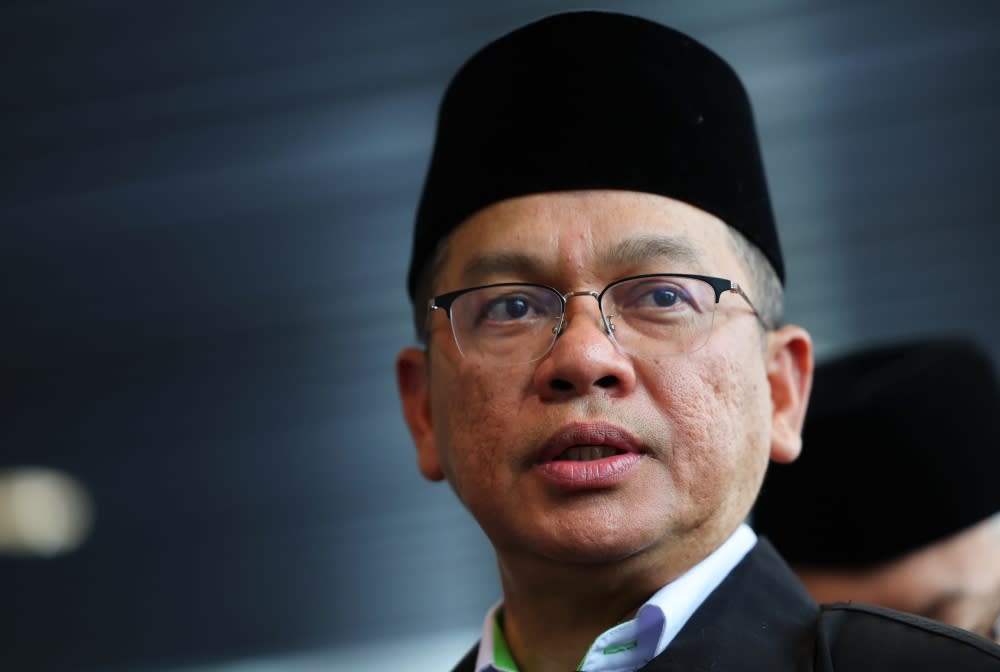After Hadi’s remark, religious affairs minister says inaccurate to claim ‘no DNAA in Islam’

KUALA LUMPUR, Sept 14 — It is inaccurate to claim that there is no concept of “discharge not amounting to acquittal” (DNAA) in Islam and that it is inconsistent with the faith, minister in charge of religious affairs Datuk Seri Mohd Na’im Mokhtar said today.
While he did not pinpoint PAS president and Marang MP Tan Sri Abdul Hadi Awang as having made the remarks, the minister in the Prime Minister’s Department sought to put the record straight by saying that remarks by “certain quarters” that said DNAA was not related to Islam are “not accurate and can be disputed”.
“The Prime Minister’s Department (Religious Affairs) is of the opinion that the view — that states that the DNAA concept which is provided for in Shariah criminal procedural laws in Malaysia as being inconsistent with Islamic criminal laws — is not accurate,” the minister said in a five-page statement here.
He also noted that the concept is present in Shariah laws in Malaysia at both the federal level and all the states of Malaysia.
Citing the works of late Islamic scholar Abdul Karim Zaidan in his writings, Na’im said the principle outlined by the scholar fits with the concept of DNAA where an accused can be discharged without being acquitted and the prosecution could be continued in the future in court.
Na’im said a principle outlined by the same Islamic scholar is contained in the legal provisions related to DNAA in Section 103 of the Shariah Criminal Procedure (Federal Territories) Act 1997 and Section 254 of the Criminal Procedure Code, which are respectively a federal-level Shariah law and a civil law in Malaysia.
Section 103 provides that the prosecutor may inform the court that he does not intend to continue prosecuting the accused person “at any stage of any trial, before the delivery of judgment”, if the prosecutor thinks fit, and that the accused shall then be discharged from the charge and that “such discharge shall not amount to an acquittal” unless the court directs for an acquittal.
Na’im said Section 103 is also found in all state laws in states in Malaysia regarding Shariah criminal procedure, except for the state of Kedah where this provision is contained in Section 104 of its state law on Shariah criminal procedure. He added that the Section 103 provision’s contents are same as Section 254 which is used in the civil courts.
He said the Shariah Criminal Procedure (Federal Territories) Act 1997 was enacted carefully to fulfill the current needs in implementing Islamic laws and said it does not contravene “hukum syarak” or Islamic laws. He also said the 1997 law was a model law approved by the National Council for Islamic Religious Affairs’s (MKI) technical committee on Islamic and civil laws for the purpose of coordinating and standardising Islamic laws nationwide.
In giving an example of similar laws abroad, Na’im also said Qatar’s Criminal Procedure Code has a similar provision about the courts’ powers to stop proceedings at any stage for any reasons allowed under the law.
“Therefore, DNAA is a concept that has been adopted in the current legal system in Malaysia and countries abroad, in the civil courts or Shariah courts,” he said.
“Therefore, the Prime Minister’s Department (Religious Affairs) advises all to be responsible and not issue statements that confuse the public,” he concluded.
Na’im, who was formerly the chief Shariah judge of Malaysia, is also a law graduate from the International Islamic University Malaysia and also holds a master’s degree in law from the University of London and a PhD in Shariah from Universiti Kebangsaan Malaysia.
Based on the Dewan Rakyat’s Hansard, Hadi yesterday said during parliamentary proceedings that Islam firmly opposes corruption and that Islam requires those who are accused to be put on trial until the end.
Hadi then cited a centuries-old story involving a ruler from the Ottoman empire, before claiming that “it shows that there is no DNAA in Islam’s judiciary”, before going on to insist: “In Islam, there is no DNAA. No discharge without acquittal, don’t have this. Punishment must be imposed.”
Hadi did not mention Deputy Prime Minister Datuk Seri Ahmad Zahid Hamidi’s name in the Dewan Rakyat, but the latter’s high-profile case which was granted a DNAA last week has been hotly debated by the public.
Last Monday, after the prosecution decided to discontinue Zahid’s entire Yayasan Akalbudi trial and applied for a DNAA, the High Court then proceeded to grant a DNAA on all 47 charges against Zahid.
Legal experts previously told Malay Mail that the High Court cannot reject the attorney general’s decision to discontinue trials, and that the courts only have the option of either ordering a DNAA or an acquittal.
A DNAA would allow the prosecution to charge the accused with the same charges in the future, as opposed to an acquittal where the prosecution cannot bring the accused back to the court to be charged with the same charges.



